Kai Hui
Can Pre-training Indicators Reliably Predict Fine-tuning Outcomes of LLMs?
Apr 16, 2025Abstract:While metrics available during pre-training, such as perplexity, correlate well with model performance at scaling-laws studies, their predictive capacities at a fixed model size remain unclear, hindering effective model selection and development. To address this gap, we formulate the task of selecting pre-training checkpoints to maximize downstream fine-tuning performance as a pairwise classification problem: predicting which of two LLMs, differing in their pre-training, will perform better after supervised fine-tuning (SFT). We construct a dataset using 50 1B parameter LLM variants with systematically varied pre-training configurations, e.g., objectives or data, and evaluate them on diverse downstream tasks after SFT. We first conduct a study and demonstrate that the conventional perplexity is a misleading indicator. As such, we introduce novel unsupervised and supervised proxy metrics derived from pre-training that successfully reduce the relative performance prediction error rate by over 50%. Despite the inherent complexity of this task, we demonstrate the practical utility of our proposed proxies in specific scenarios, paving the way for more efficient design of pre-training schemes optimized for various downstream tasks.
Inference Scaling for Long-Context Retrieval Augmented Generation
Oct 06, 2024



Abstract:The scaling of inference computation has unlocked the potential of long-context large language models (LLMs) across diverse settings. For knowledge-intensive tasks, the increased compute is often allocated to incorporate more external knowledge. However, without effectively utilizing such knowledge, solely expanding context does not always enhance performance. In this work, we investigate inference scaling for retrieval augmented generation (RAG), exploring strategies beyond simply increasing the quantity of knowledge. We focus on two inference scaling strategies: in-context learning and iterative prompting. These strategies provide additional flexibility to scale test-time computation (e.g., by increasing retrieved documents or generation steps), thereby enhancing LLMs' ability to effectively acquire and utilize contextual information. We address two key questions: (1) How does RAG performance benefit from the scaling of inference computation when optimally configured? (2) Can we predict the optimal test-time compute allocation for a given budget by modeling the relationship between RAG performance and inference parameters? Our observations reveal that increasing inference computation leads to nearly linear gains in RAG performance when optimally allocated, a relationship we describe as the inference scaling laws for RAG. Building on this, we further develop the computation allocation model to estimate RAG performance across different inference configurations. The model predicts optimal inference parameters under various computation constraints, which align closely with the experimental results. By applying these optimal configurations, we demonstrate that scaling inference compute on long-context LLMs achieves up to 58.9% gains on benchmark datasets compared to standard RAG.
Gecko: Versatile Text Embeddings Distilled from Large Language Models
Mar 29, 2024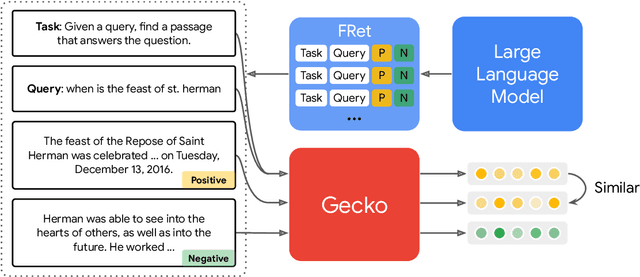


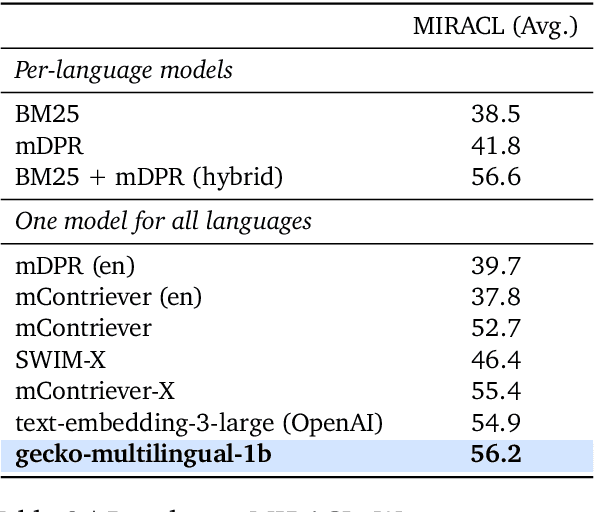
Abstract:We present Gecko, a compact and versatile text embedding model. Gecko achieves strong retrieval performance by leveraging a key idea: distilling knowledge from large language models (LLMs) into a retriever. Our two-step distillation process begins with generating diverse, synthetic paired data using an LLM. Next, we further refine the data quality by retrieving a set of candidate passages for each query, and relabeling the positive and hard negative passages using the same LLM. The effectiveness of our approach is demonstrated by the compactness of the Gecko. On the Massive Text Embedding Benchmark (MTEB), Gecko with 256 embedding dimensions outperforms all existing entries with 768 embedding size. Gecko with 768 embedding dimensions achieves an average score of 66.31, competing with 7x larger models and 5x higher dimensional embeddings.
Generate, Filter, and Fuse: Query Expansion via Multi-Step Keyword Generation for Zero-Shot Neural Rankers
Nov 15, 2023



Abstract:Query expansion has been proved to be effective in improving recall and precision of first-stage retrievers, and yet its influence on a complicated, state-of-the-art cross-encoder ranker remains under-explored. We first show that directly applying the expansion techniques in the current literature to state-of-the-art neural rankers can result in deteriorated zero-shot performance. To this end, we propose GFF, a pipeline that includes a large language model and a neural ranker, to Generate, Filter, and Fuse query expansions more effectively in order to improve the zero-shot ranking metrics such as nDCG@10. Specifically, GFF first calls an instruction-following language model to generate query-related keywords through a reasoning chain. Leveraging self-consistency and reciprocal rank weighting, GFF further filters and combines the ranking results of each expanded query dynamically. By utilizing this pipeline, we show that GFF can improve the zero-shot nDCG@10 on BEIR and TREC DL 2019/2020. We also analyze different modelling choices in the GFF pipeline and shed light on the future directions in query expansion for zero-shot neural rankers.
PaRaDe: Passage Ranking using Demonstrations with Large Language Models
Oct 22, 2023



Abstract:Recent studies show that large language models (LLMs) can be instructed to effectively perform zero-shot passage re-ranking, in which the results of a first stage retrieval method, such as BM25, are rated and reordered to improve relevance. In this work, we improve LLM-based re-ranking by algorithmically selecting few-shot demonstrations to include in the prompt. Our analysis investigates the conditions where demonstrations are most helpful, and shows that adding even one demonstration is significantly beneficial. We propose a novel demonstration selection strategy based on difficulty rather than the commonly used semantic similarity. Furthermore, we find that demonstrations helpful for ranking are also effective at question generation. We hope our work will spur more principled research into question generation and passage ranking.
Beyond Yes and No: Improving Zero-Shot LLM Rankers via Scoring Fine-Grained Relevance Labels
Oct 21, 2023Abstract:Zero-shot text rankers powered by recent LLMs achieve remarkable ranking performance by simply prompting. Existing prompts for pointwise LLM rankers mostly ask the model to choose from binary relevance labels like "Yes" and "No". However, the lack of intermediate relevance label options may cause the LLM to provide noisy or biased answers for documents that are partially relevant to the query. We propose to incorporate fine-grained relevance labels into the prompt for LLM rankers, enabling them to better differentiate among documents with different levels of relevance to the query and thus derive a more accurate ranking. We study two variants of the prompt template, coupled with different numbers of relevance levels. Our experiments on 8 BEIR data sets show that adding fine-grained relevance labels significantly improves the performance of LLM rankers.
Large Language Models are Effective Text Rankers with Pairwise Ranking Prompting
Jun 30, 2023



Abstract:Ranking documents using Large Language Models (LLMs) by directly feeding the query and candidate documents into the prompt is an interesting and practical problem. However, there has been limited success so far, as researchers have found it difficult to outperform fine-tuned baseline rankers on benchmark datasets. We analyze pointwise and listwise ranking prompts used by existing methods and argue that off-the-shelf LLMs do not fully understand these ranking formulations, possibly due to the nature of how LLMs are trained. In this paper, we propose to significantly reduce the burden on LLMs by using a new technique called Pairwise Ranking Prompting (PRP). Our results are the first in the literature to achieve state-of-the-art ranking performance on standard benchmarks using moderate-sized open-sourced LLMs. On TREC-DL2020, PRP based on the Flan-UL2 model with 20B parameters outperforms the previous best approach in the literature, which is based on the blackbox commercial GPT-4 that has 50x (estimated) model size, by over 5% at NDCG@1. On TREC-DL2019, PRP is only inferior to the GPT-4 solution on the NDCG@5 and NDCG@10 metrics, while outperforming other existing solutions, such as InstructGPT which has 175B parameters, by over 10% for nearly all ranking metrics. Furthermore, we propose several variants of PRP to improve efficiency and show that it is possible to achieve competitive results even with linear complexity. We also discuss other benefits of PRP, such as supporting both generation and scoring LLM APIs, as well as being insensitive to input ordering.
RD-Suite: A Benchmark for Ranking Distillation
Jun 12, 2023



Abstract:The distillation of ranking models has become an important topic in both academia and industry. In recent years, several advanced methods have been proposed to tackle this problem, often leveraging ranking information from teacher rankers that is absent in traditional classification settings. To date, there is no well-established consensus on how to evaluate this class of models. Moreover, inconsistent benchmarking on a wide range of tasks and datasets make it difficult to assess or invigorate advances in this field. This paper first examines representative prior arts on ranking distillation, and raises three questions to be answered around methodology and reproducibility. To that end, we propose a systematic and unified benchmark, Ranking Distillation Suite (RD-Suite), which is a suite of tasks with 4 large real-world datasets, encompassing two major modalities (textual and numeric) and two applications (standard distillation and distillation transfer). RD-Suite consists of benchmark results that challenge some of the common wisdom in the field, and the release of datasets with teacher scores and evaluation scripts for future research. RD-Suite paves the way towards better understanding of ranking distillation, facilities more research in this direction, and presents new challenges.
How Does Generative Retrieval Scale to Millions of Passages?
May 19, 2023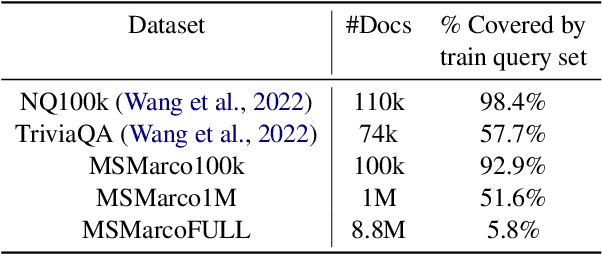
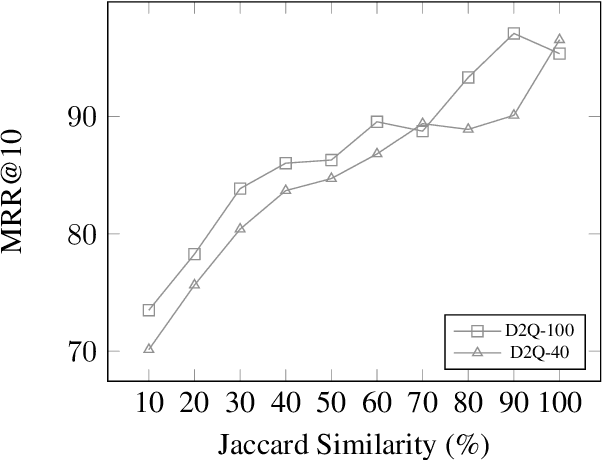
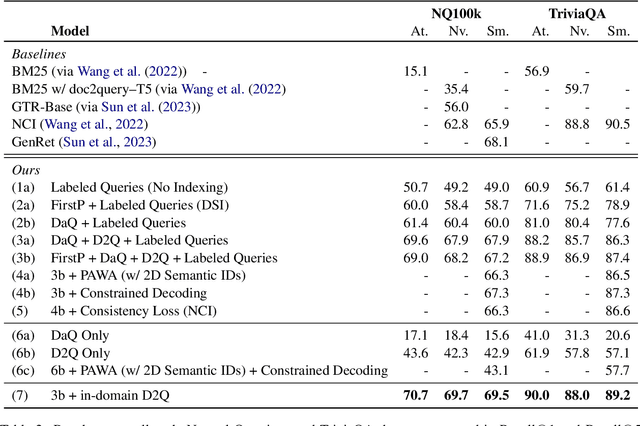
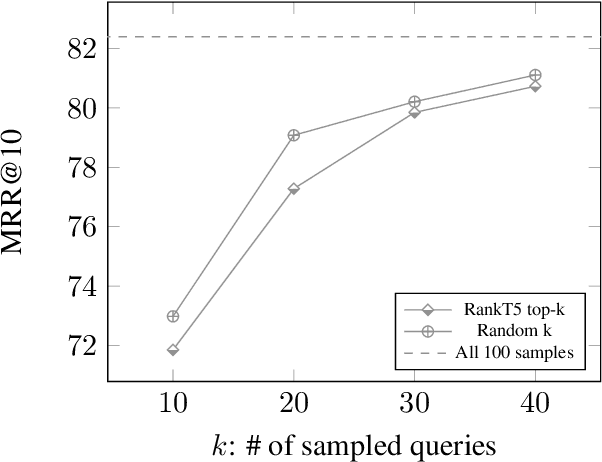
Abstract:Popularized by the Differentiable Search Index, the emerging paradigm of generative retrieval re-frames the classic information retrieval problem into a sequence-to-sequence modeling task, forgoing external indices and encoding an entire document corpus within a single Transformer. Although many different approaches have been proposed to improve the effectiveness of generative retrieval, they have only been evaluated on document corpora on the order of 100k in size. We conduct the first empirical study of generative retrieval techniques across various corpus scales, ultimately scaling up to the entire MS MARCO passage ranking task with a corpus of 8.8M passages and evaluating model sizes up to 11B parameters. We uncover several findings about scaling generative retrieval to millions of passages; notably, the central importance of using synthetic queries as document representations during indexing, the ineffectiveness of existing proposed architecture modifications when accounting for compute cost, and the limits of naively scaling model parameters with respect to retrieval performance. While we find that generative retrieval is competitive with state-of-the-art dual encoders on small corpora, scaling to millions of passages remains an important and unsolved challenge. We believe these findings will be valuable for the community to clarify the current state of generative retrieval, highlight the unique challenges, and inspire new research directions.
Learning List-Level Domain-Invariant Representations for Ranking
Dec 21, 2022Abstract:Domain adaptation aims to transfer the knowledge acquired by models trained on (data-rich) source domains to (low-resource) target domains, for which a popular method is invariant representation learning. While they have been studied extensively for classification and regression problems, how they apply to ranking problems, where the data and metrics have a list structure, is not well understood. Theoretically, we establish a domain adaptation generalization bound for ranking under listwise metrics such as MRR and NDCG. The bound suggests an adaptation method via learning list-level domain-invariant feature representations, whose benefits are empirically demonstrated by unsupervised domain adaptation experiments on real-world ranking tasks, including passage reranking. A key message is that for domain adaptation, the representations should be analyzed at the same level at which the metric is computed, as we show that learning invariant representations at the list level is most effective for adaptation on ranking problems.
 Add to Chrome
Add to Chrome Add to Firefox
Add to Firefox Add to Edge
Add to Edge